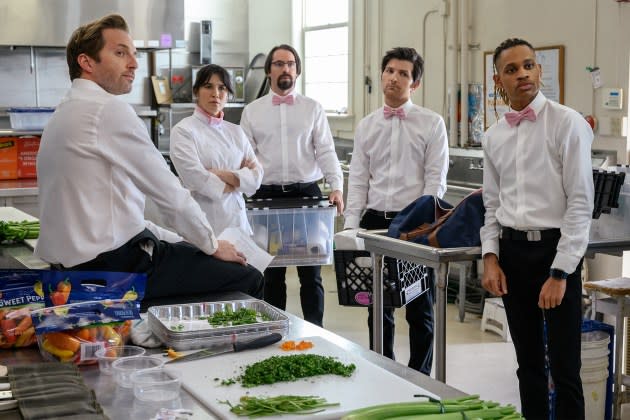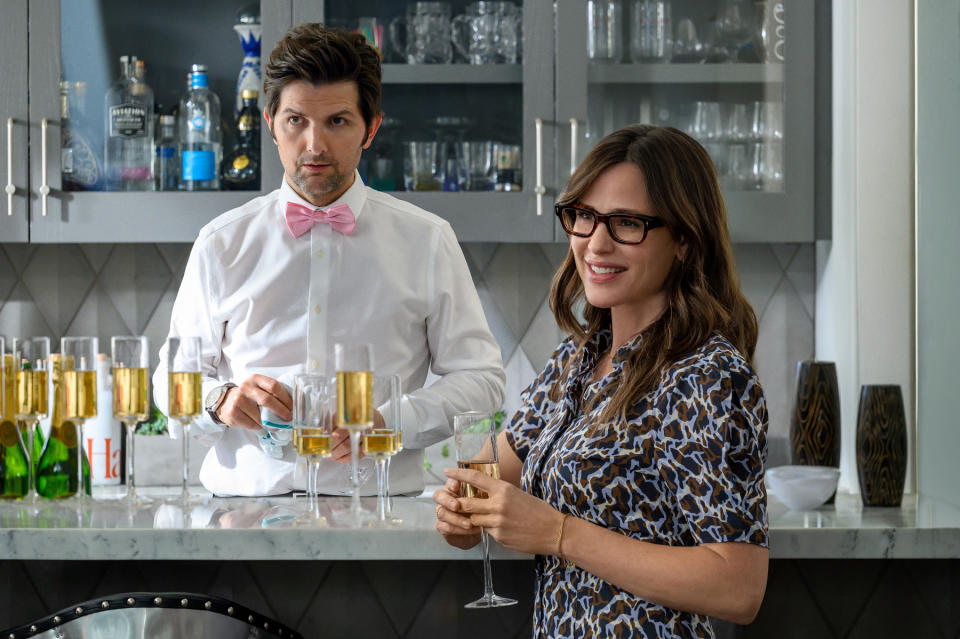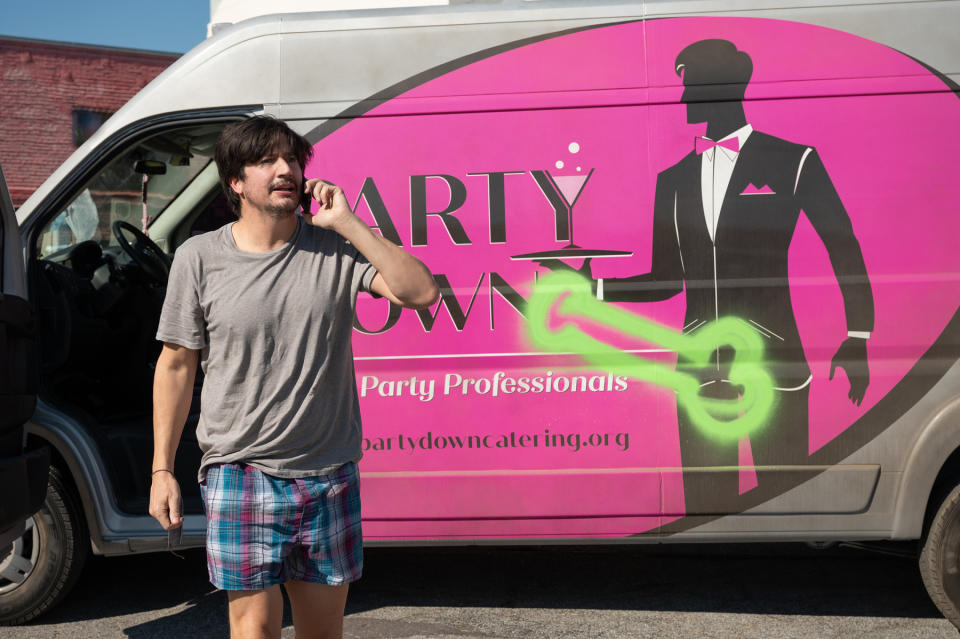On the Rowdy Set of the ‘Party Down’ Revival With Paul Rudd, Adam Scott and More
- Oops!Something went wrong.Please try again later.
- Oops!Something went wrong.Please try again later.
- Oops!Something went wrong.Please try again later.
- Oops!Something went wrong.Please try again later.
- Oops!Something went wrong.Please try again later.
- Oops!Something went wrong.Please try again later.
- Oops!Something went wrong.Please try again later.

One sunny winter morning on a Malibu cliff overlooking the Pacific, a luau for radio-contest winners is in full swing. Dozens of middle-aged men in loud Hawaiian shirts are pregaming for a Sting concert, and mostly being ignored by a staff of cater-waiters tripping balls on mushrooms. Bartender Henry Pollard, clad in a white button-down and pink bow tie, is struggling to focus on the drinks rather than the guests’ attire. His new co-worker Sackson smiles and explains that he’s happy because “a bird just looked at me in a certain way.”
As Henry often says: “Are we having fun yet?”
More from Rolling Stone
In Hollywood, Criticizing Israel's Assault on Gaza Comes With a Price
How Hollywood's Sex Scenes Will Change With the New SAG-AFTRA Contract
On the set of the Party Down reunion, they sure as hell are. Thirteen years after the cult-favorite comedy about Hollywood wannabes struggling to make a living at the titular catering company was last onscreen, most of the original cast and some new faces have joined forces to bring it back to life. Adam Scott, returning to play Henry, cracks up newcomer Jennifer Garner as they bang on a port-a-potty in a quest to rescue Sackson (Tyrel Jackson Williams) from a bad trip. Ken Marino, reprising his role as uptight, incompetent catering-team leader Ron Donald, is directing the episode, and gets so focused on pulling off a long, unbroken take of the party that he forgets he’s also supposed to be on camera. “Oh, right! I’m in this scene!” he says with a laugh, before jogging to his spot next to guest star Judy Reyes. Garner, grinning, describes the banter among Scott, Marino, and the rest of the returning cast as “kind of a good-natured abuse, like the little-kid joy of being back together.”
The revival, which debuts on Starz on Feb. 24, marks one of TV’s unlikeliest returns, even in an era teeming with reboots, sequels, and IP cash grabs. After two seasons, from 2009 to 2010, Party Down was abruptly — if justifiably, from a business perspective — canceled. As co-creator John Enbom recalls, a Starz executive “showed us that we were at a 0.0 for the ratings for the finale. We were like, ‘Gosh, we can’t really argue with that, can we?’”
But the show became more powerful in death than it ever had been in life. It’s not just that the cast — including Scott, Jane Lynch as chipper, never-was actress Constance, and Martin Starr as arrogant screenwriter Roman — became famous on higher-profile projects. It’s that as Party Down began appearing on Netflix and other streamers, viewers finally discovered its raucous, dirty, clever brand of comedy, along with, as another of the show’s creators, Paul Rudd, explains, “A universal relatability. This is a collection of people who have loftier goals, who are not where they want to be in life.”

It was also made with a loose, fuck-it attitude that audiences ate up — eventually. “Because no one was watching or caring, we were just doing it for ourselves,” explains Scott. “We were just having a great time and knew how good it was. It really felt like we were making something special, and at some point someone will notice.”
The idea itself took a while for anyone to notice. Back in the early 2000s, Enbom, Rudd, and their TV-producer friends Rob Thomas and Dan Etheridge would gather regularly for what Etheridge describes as “high movie nights at Rob’s house.” A British ex-girlfriend had encouraged Thomas to watch the original, Ricky Gervais-led Office; by the end of the first scene, Thomas says, “I was just mesmerized, and thought, ‘Holy fuck, this is the future of television.’” He introduced it to the others, who were similarly gobsmacked. “It rocked our worlds,” says Rudd.
Soon, the foursome went from loving The Office to wanting to create their own version of it. After batting around potential workplaces, they settled on a catering company, drawing in part on Rudd’s pre-fame experience as a wedding and bar mitzvah DJ. Each episode would be shot on location for a different kind of party, with different guest stars. At one point in the development phase, Thomas recognized a bartender at an event as an actor who had appeared on a series Thomas had produced, and decided to tell him the idea. “I got into the middle of the pitch and realized how horrible it was that I was pitching this to somebody who’d done a couple days on one of my shows, who was now a cater-waiter. He did not want to hear this.”
It was a mortifying moment appropriate for Party Down itself, where Henry and the others constantly found even the most modest ambitions end in abject humiliation, like Ron projectile vomiting in front of his high school crush while catering their 20-year class reunion. (Many episode ideas began with these climactic disasters, and the writers would then work backward to make them happen.)
The original plan was for Rudd to play Henry, once famous for a series of beer commercials with the motto “Are we having fun yet?” When the ads fail to translate into an ongoing acting career, Henry gives up on life and goes back to work at Party Down with Ron, an overbearing clod in the vein of Gervais’ David Brent. (Before Steve Carell was hired for the American Office remake, Rudd hoped to have his frequent co-star play Ron.) The show was in development for a while at HBO, but everyone saw the writing on the wall when an executive there began a notes meeting by saying, “Now, we realize outlines aren’t supposed to be funny…” Then there was a brief development stint at FX, until the powers that be decided it wouldn’t be a good match for It’s Always Sunny in Philadelphia.
Thomas, who describes Party Down as “a show about coming to terms with defeat,” refused to accept his own. To convince potential TV homes of the show’s appeal, he spent $150,000 of his own money in 2007 filming a DIY pilot in his backyard with friends. Rudd’s film career had taken off, so Scott (who’d originally been tapped to play Roman) stepped in as Henry, joining Marino, Lynch (who knew Rudd from 40-Year-Old Virgin), and Ryan Hansen (of Thomas, Etheridge, and Enbom’s teen detective drama Veronica Mars) as dim, professionally handsome Kyle.
Even this proof of concept failed to get them anywhere for a few more years; Thomas remembers screening the episode for a Showtime exec who laughed throughout, then said, “I have no idea how I would market this show.” Eventually, Starz showed an interest, as part of an attempt to get into the comedy business. They agreed to make it for such a modest budget that Enbom was the only creator who could work on it full-time.
Creatively, Starz got a bargain. The six main actors, including Lizzy Caplan as comedian (and Henry’s love interest) Casey, had instant chemistry. Enbom kept placing them in ludicrous, extremely adult situations that brought out the best in each character. In one episode, the team works a porn-awards-show afterparty where Henry and Casey take ecstasy, a producer tries to hire the enormously endowed Ron, and Roman blows a sure thing with an adult-film actress because he can’t stop himself from lecturing her about the difference between fantasy and “hard sci-fi.” That last joke is quintessential Party Down: deeply uncomfortable yet hilarious, and a perfect example of a show establishing its characters so well that, as Enbom puts it, “You barely even have to write it down. You know what’s going to happen.”
Yet for all the raunch — Thomas and Marino both recall extensive debates about how long to show Ron’s penis (about two excruciating seconds) and how long he should vomit in the reunion episode (over 20 seconds) — there was genuine emotion, too, much of it drawn from the frustrations each cast member had experienced in their own careers. “The feelings you were seeing were very real, raw feelings,” says Scott, “and here we were, being able to put them somewhere.”

Beyond the recognizable theme of dreams deferred, there’s the simple fact that everyone has been to parties where ridiculous things happen. In between takes of the luau episode for the new season, actors and extras swap stories about the most cringe-inducing mishaps they witnessed, including a marriage that did not survive to the end of the wedding reception.
Still, back in the late-2000s, those big laughs and relatable ideas weren’t translating into viewers. During the second season, HBO vet Chris Albrecht was hired to run Starz, and he had no attachment to Party Down. “He wanted to get rid of all the old shows and make it all his own weird, I don’t even know, Naked Gladiators or whatever,” says Megan Mullally, who’d joined the cast — succeeding Lynch, who had to depart due to a prior commitment to Glee — as Lydia, momager to a would-be teen pop star. (Though Albrecht’s interest in extremely nude programming like Spartacus wasn’t a complete change from the previous management; Ryan Hansen remembers an earlier note from an executive requesting “More boobs.”) Between the paltry ratings and Albrecht’s apathy, filming that season’s last episode was trying. At one point, Scott broke down crying “because I felt like that was it,” he says. “We were going to get fucking canceled.” Soon after, he was proven right.
Ordinarily, that would have been that. Shows whose final episodes attract 13,000 viewers tend to die and stay dead. Instead, audiences discovered Party Down via streaming. In New Orleans for Halloween in 2011, Etheridge saw “a gaggle of college-age gentlemen in Party Down waiter uniforms.” (They weren’t the only ones: “Doing press for other shows,” Starr says, “I’d wear a pink bow tie because I missed it.”) The creators came close to reviving the show a few times; a deal for a movie fell through in 2014. But by 2019, Albrecht was gone, new Starz president Jeffrey Hirsch had publicly come out as a fan of the show, and a full cast reunion at a Vulture Festival panel made everyone wonder, as Etheridge recalls, “Why aren’t we doing this again?”
With renewed interest all around, the first challenge was figuring out how to reassemble these busier and more-famous actors. The producers found a window where nearly the entire group would be free, though Caplan had to drop out because of a commitment to another show. (“She was really sad to not be a part of it,” says Starr, who has known her since the third grade.) There were other complications. Mullally, skeptical that the new season would ever happen, booked a movie that was filming at the exact same time, and was only able to come in on weekends. The emergence of the Omicron variant threatened to cancel the tightly scheduled shoot. Lynch came down with Covid, which meant she had to film some of her scenes from a hotel room, with Constance video-chatting with Ron and the others on a tablet.
The creative side proved just as tricky as the logistical one. Scott joined the original four creators over Zoom to plot out the new season, which had to justify why all the characters would still be interacting years later, without seeming bleak. “We wanted to avoid the idea that the show felt sad, that all these people never did anything or went anywhere 10 years later,” says Enbom. They decided that some characters, like Ron and Roman, would have been catering this whole time; that some, like Henry (newly divorced and needing extra money to pay his alimony), would return to the job after long absences; and that others, like Constance and Lydia, would have moved on to bigger and better things, but keep winding up at events their former colleagues were working.
And where other revivals often struggle to resituate their characters in a new time period, the explosion of the gig economy over the past decade made Enbom realize, “We’re still relevant. This stuff never went away, and if anything, it’s taking over.” The new episodes also manage to incorporate the devastating impact the pandemic had on the events industry, as we find out that Ron got Covid four times working underground parties. In the original run, the budget was so small that Enbom often had to write in explanations for why various parties were so sparsely-attended; Starz is paying everyone more now, but the number of extras is roughly the same for health and safety reasons.
A new era also demands new blood. Beyond the special guest stars in each episode — including James Marsden, Nick Offerman, and Quinta Brunson — Garner plays Evie, a movie producer who becomes romantically entangled with Henry. (To prep for the job, Garner watched the first two seasons with her kids: “They’re mostly horrified that I’m doing it, because they love Lizzy Caplan so much that they feel like I’m going to be run out of town.”) Williams and Zoë Chao play, respectively, Sackson, an aspiring influencer who has to keep explaining that his chosen career is “content,” and Lucy, an avant-garde chef concerned more with the emotional reaction her food elicits than whether it tastes good.
And everyone is living up to Henry’s old catchphrase. On Scott’s first day of shooting, “Getting to see Ken play Ron Donald again filled my heart with joy. We did a take, and Ken and I just looked at each other and hugged.” The thrill of being back in one another’s company has everyone hoping this won’t be a one-shot deal — and that Caplan might be able to come back if there’s another season.
Most ongoing sitcoms begin to incorporate the lives and personalities of the actors into the characters they play. Even Roman ruining his shot with the porn star came from a recognizable emotional place for Starr. (“That’s totally me,” he admits. “I’ve absolutely done that.”) If art imitates life with this show, life has stubbornly refused to return the favor this time around. After so many years of letdowns, Party Down’s return is hard to believe even for the people doing it. Some days, Chao, who spent four-and-a-half years as a cocktail waitress and bartender before her acting career took off, would look at her costume and at the steam trays in front of her and have to remind herself that she wasn’t a server anymore. “I’d ask, ‘Am I going to make it to the next day? Do I still have dreams?’ And I would remember, ‘Oh, wait. I’m living my dream. I’m living on this show, one of my favorite shows of all time.’”
Best of Rolling Stone

